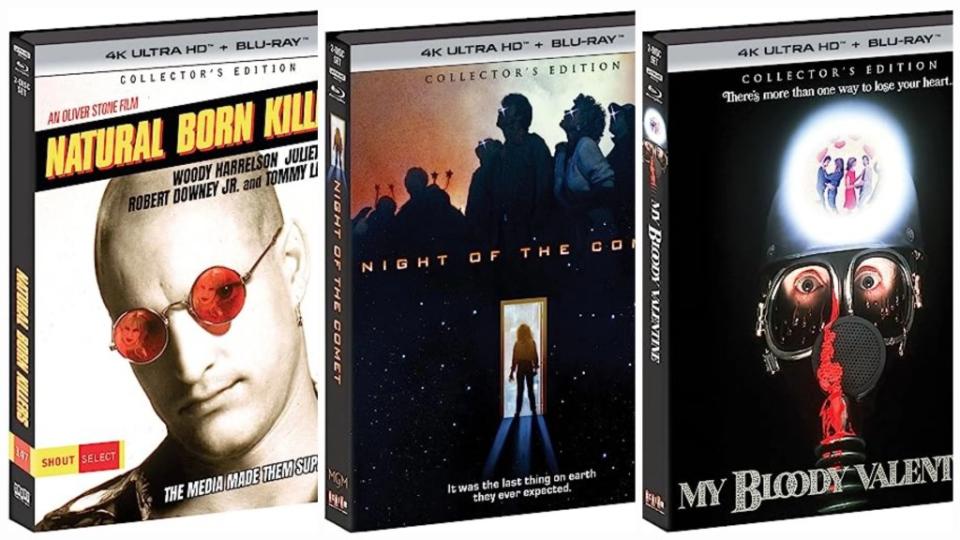The 4K Blu-ray Collectors Market Is the Future of Physical Media
Who buys Blu-rays anymore? That’s the question posed by many people as the age of streaming reigns supreme and DVD and Blu-ray sales are plummeting. Even Best Buy, historically one of the largest suppliers of physical media, has stopped selling physical discs. It’s the digital age, and everything you could ever want is at your fingertips, just a click and a stream away.
Except maybe not.
As the streaming boom gives way to consolidation and cost-cutting, consumers are learning the truth of a digital library: it’s not yours. Studios like Warner Bros. and Disney can pull a show or film off a streaming service at a whim. Not even the digital copy you bought is really yours – that license can be yanked at the studio’s discretion, with just as little warning. But the push to streaming and digital has wreaked havoc on the physical media industry. Blu-ray and DVD sales fell 27% in the third quarter to $363 million compared to 2022, and have plummeted from total revenue of over $4.7 billion in 2017 to just over $1.5 billion in 2022, according to Digital Entertainment Group.
But there’s one area of physical media that’s actually growing: 4K Ultra HD Blu-ray.
This rising segment of the physical media market is quickly being targeted as the future for studios, retailers and filmmakers alike. Studios are investing significant resources into bespoke 4K Blu-ray releases, leaning into the consumer as a collector with limited editions, and the sales are increasing. Filmmakers, too, are embracing the format not only as the most pristine presentation of their film and a vehicle for robust behind-the-scenes bonus features, but also as a safeguard against the impermanence of streaming and digital.

Christopher Nolan’s “Oppenheimer” wasn’t just one of the biggest movies of the year at the box office, it also has become a coveted 4K disc to the point that Universal sold out of 4K Blu-ray copies this past November. That disc is now on track to become the biggest-selling 4K of all time for Universal, an individual with knowledge told TheWrap, though the person did not discuss specific numbers.
The physical media market isn’t gasping for air, but it is in a period of intense transformation. And with a little help from some passionate filmmakers, studios that are leaning into the collector aspect of 4K Blu-ray are finding success — not unlike how the music industry pivoted in recent years to producing more vinyl as CD sales cratered in most countries.
“A good Blu-ray is sharp as a tack — and consistent,” Wes Anderson told TheWrap over email. “It always plays exactly right. It does not disappear from a cloud or platform. It sits on a shelf in your living room and is right there when you need it.”
Nolan put it more bluntly when speaking at a release event for the “Oppenheimer” 4K Blu-ray. He said he puts as much care and attention into the home video version of the film as he does the theatrical so consumers have “a version you can buy and own at home and put on a shelf so no evil streaming service can come steal it from you.”
Eight of Wes Anderson’s films have gotten the Criterion Collection treatment so far — curated Blu-ray discs packed with bonus features and custom artwork. “Putting together one of these editions is always entertaining and complicated and worth every second we put into it,” Anderson said. “For me, it’s the perfect little archive and a great way to permanently share the movie.”
While Criterion has been curating discs specifically for physical media collectors for decades, other studios have now come around to the idea of treating 4K releases like collector’s items, and consumers are responding enthusiastically.
4K Blu-ray sales rose almost 6% in the third quarter of 2023 compared to 2022, and at the end of 2022 were up 20% year-over-year, marking the only segment of the physical disc business to grow, according to numbers from Digital Entertainment Group. The third-quarter total of $363 million did not include the robust “Oppenheimer” numbers as discs didn’t hit shelves until Nov. 21. (Consumer spending on digital copies and rentals, meanwhile, topped over $1 billion.) New releases continue to drive 4K sales, as “Spider-Man: Across the Spider-Verse” and “Guardians of the Galaxy Vol. 3” were top titles in the third quarter, with over one-quarter of sales coming in the form of 4K Blu-ray.

For studios like Universal and Paramount, 4K Blu-ray is a fruitful investment. The decline of physical media sales over the past decade has been replaced on their bottom line by streaming and digital (or PVOD) sales. In 2017, consumers spent $13.6 billion on digital – including both digital purchases of movies and TV shows and streaming subscriptions. In 2022 that number ballooned to $34.5 billion, according to Digital Entertainment Group.
The rise in 4K Blu-rays coincides with a rise in 4K television purchases — a necessity to play a 4K disc, along with a 4K Blu-ray player. The 4K TV market will grow by 24% from $229.73 billion in 2023 to $285.28 billion in 2024, according to a report from The Business Research Company. Most streaming services now offer 4K resolution, albeit for an upcharge.
While the physical media business as a whole continues to decline, studios don’t anticipate backing out of 4K anytime soon.
“As expected, over recent years, we have seen our physical disc business reduced as digital grows,” a Universal Home Entertainment spokesperson told TheWrap. “That said, there is a meaningful number of consumers who remain committed to physical discs and [it] presents an opportunity for us to maintain engagement in the category, as evidenced by the runaway success of ‘Oppenheimer.’”
Universal isn’t the only major studio still investing in physical media. Paramount has been mining its library for bespoke collections like the 25th anniversary edition of “Titanic” (complete with a coffee table book and menus from the original voyage) and the “Paramount Scares” collection of iconic horror films in 4K, both of which were released in 2023.
“The physical market was really driven very much by kids and family product early on, but now it’s really being sustained by the collector who appreciates everything it has to offer,” Bob Buchi, president of Paramount Worldwide Home Entertainment, told TheWrap.
Revitalizing library content also allows filmmakers and studios to restore classic titles, and Buchi said the scarcity of limited edition box sets adds to their value as well. While Best Buy may have stopped selling physical discs, Buchi said Amazon and Walmart remain supportive big box partners. “There’s a very avid group of consumers that love physical media, and we’re committed to that,” he added.
Physical media fandom is all over the internet. There’s a 4K Reddit thread with over 44,000 followers where people share photos of their recent 4K Blu-ray acquisitions, discuss news and share sales. YouTube accounts like Films At Home (123,000 subscribers) document the latest releases and weigh the pros and cons of recent transfers. X (nee Twitter) accounts like Dawn of the Discs (with over 43,000 followers) and The Digital Bits (the social media account for one of the websites from the heyday of DVD) offer the latest up-to-the-minute home video news, with an emphasis on 4K.
The hashtag #4KUltraHD trends on X, like when reports started trickling in that Best Buy was already removing the shelves that used to be stocked with home video titles.
In terms of sales, there’s also a halo effect on 4K Blu-rays when a studio releases a new entry in a franchise. 2023 saw the release of new “Mission: Impossible” and “Transformers” movies for Paramount, and 2018’s “Mission: Impossible — Fallout” topped the list of the best-selling 4K discs for the year, while two previous “Transformers” movies also landed in the Top 10.
Boutiques on the rise

Last fall, NEON — the studio behind Ava DuVernay’s “Origin” and Michael Mann’s “Ferrari” — released a deluxe 4K Blu-ray version of Park Chan-wook’s “Oldboy” on its official online store. The set cost $75 and contained 18 hours of bonus features. According to one insider working in the physical media space, the “Oldboy” release was the opening salvo in a push to release special editions of its films directly (previous NEON titles like “Memories of Murder,” “Parasite” and “Triangle of Sadness” were released via the Criterion Collection) and to corner the new collectible physical media market. “NEON thinks the only difference between it and A24 is that A24 has better merchandise,” the insider said of the rival studio that’s become a popular brand in the cinephile community. The $75 “Oldboy” 4K release sold out.
Another label gaining steam is Shout Factory, which was founded in 2002 at the height of the home video craze. Like Criterion, Shout has diversified with online streaming platforms and FAST channels but has still remained loyal to its bread-and-butter: physical media.
Garson Foos, the co-founder and CEO of Shout, told TheWrap that sales of 4K Blu-rays are “now where Blu-ray was when Blu-ray was in its early days,” and he sees the format as an investment owing to the expensive costs associated with creating a 4K disc. Foos pointed to recent Shout releases like “JFK” and “Natural Born Killers” as projects that were pricey — particularly “Natural Born Killers” for its complicated rights issues related to its soundtrack — but sold incredibly well.
And then there’s the Shout blockbuster that nobody could have predicted — a 4K Blu-ray of “Clue,” Jonathan Lynn’s 1985 adaptation of the board game. Like “Oppenheimer,” “Clue” sold out everywhere. To Foos, these are investments in the future: He thinks discs like “Clue” will sell for “years.”
Part of Shout’s success has to do with its partnerships with companies like GKids, who license the Studio Ghibli movies stateside, including “The Boy and the Heron,” along with other animated titles. Another exciting deal finds Shout and The Jim Henson Company teaming up, with Shout set to produce new versions of “Labyrinth” and “The Dark Crystal.” “For what that theatrical movie is to a studio, those movies are to us,” Foos said. “They’re huge priorities. We’re going to market them like crazy and get every ounce out of those titles that we can potentially get out of them.”
As for the future of home video, Foos said that while physical media accounts for about a third of Shout’s business, it’s a priority. “It’s certainly kept going stronger for longer than we could have ever thought,” he said. Plus, Foos said that every time a major streamer removes a swath of titles, Shout sees an uptick in sales.
A fight for the future

For filmmakers, the importance of physical media isn’t just practical, it’s existential. Pop music star “Weird” Al Yankovic co-wrote and co-starred in his own Emmy-winning biopic, 2022’s “Weird: The Al Yankovic Story.” The movie debuted as a Roku Original, exclusively to those who own a Roku device, which exposed “Weird” to a huge audience (in the third quarter of 2023 Roku reported 75.8 million active accounts worldwide). But now the movie also has a physical release thanks to Shout Studios.
Yankovic, an admitted physical media diehard (“When the grid goes down, I need to be in my cave with my Blu-rays,” he recalled telling his wife), told TheWrap that he and Eric Appel, the director of “Weird,” pushed to give the film a physical release. “They didn’t really have the infrastructure in place or they didn’t have a record of doing this kind of thing. We’re getting them into working with other studios for physical media.” Shout Studios got involved, and voila.
Yankovic said he and Appel were also motivated by creating a physical copy packed with bonus features like an audio commentary track, which was first popularized by Criterion’s robust laserdisc output that began in 1984 and inspired generations of filmmakers by offering a look behind the curtain.
Another filmmaker who pushed for a physical release of his streaming movie was “Prey” director Dan Trachtenberg, who credits Steve Asbell, president of production at 20th Century Studios, for giving the Hulu original film a robust 4K Blu-ray release – again, complete with a bounty of bonus features including a Q&A with the cast and crew conducted by “Moonlight” director (and “Prey” super-fan) Barry Jenkins. “I would buy a disc according to if there was a commentary track on it or not,” Trachtenberg told TheWrap. “That was as much my film school as actual film school — watching behind-the-scenes [documentaries] and listening to commentaries.”
Edgar Wright, the beloved filmmaker behind films like “Shaun of the Dead,” “Hot Fuzz” and “Scott Pilgrim vs. the World,” credits the physical releases and myriad bonus features for the continued success of many of his features.
“’Scott Pilgrim’ initially didn’t achieve success at the box office, but it swiftly gained a fervent cult following, not just through midnight screenings, but through the DVD and Blu-ray releases,” Wright told TheWrap over email. “Part of this following could also be attributed to the inclusion of a wealth of extras on both editions.”
Wright, who estimates he owns upwards of 2,000 DVDs and Blu-rays himself, said he loads his discs up with bonus features because he’s “worried about where it’ll be in 10 years” adding, “if I have something to share, I’d rather share it all now.” Consider it a historical record of the film that he and his collaborators made.
Plus, he said he personally learned from audio commentary tracks from other filmmakers — particularly those of Robert Rodriguez from his early films “which always felt like a free film school.”
But he is more optimistic now about the future of the format than he was five years ago. “People are now realizing that in terms of film history, streaming is the emperor’s new clothes, where not everything is available everywhere, and even if it is, the incredible extras from older films are often missing,” he said.
Wright said his optimism is cautious but praised the success of “Oppenheimer” on 4K and the work of boutique labels like Criterion, Eureka, Indicator, Arrow, BFI, Radiance and more for “doing remarkable work in restoring, preserving and championing films.”
The fervent cinephile concluded: “If you’re a true fan of a film, or if there’s a particular movie you want to see, and you can afford it, I tend to opt for a physical copy. I would find it terribly sad if the option disappeared completely.”
The post The 4K Blu-ray Collectors Market Is the Future of Physical Media appeared first on TheWrap.
